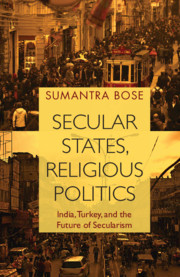Book contents
5 - Turkey: The Anti-Secularist Triumph
Published online by Cambridge University Press: 20 October 2018
Summary
Some countries … are divided over whether their society belongs to one civilization or another. These are torn countries. Their leaders typically wish to … make their countries members of the West, but the history, culture and traditions of their countries are non-Western. The prototypical torn country is Turkey. The twentieth-century leaders of Turkey followed in the Ataturk tradition and defined Turkey as a modern, secular, Western nation-state. However, elements in Turkish society have supported an Islamic revival and argued that Turkey is basically a Middle Eastern Muslim society. In addition, while the elite of Turkey has defined Turkey as a Western society, the elite of the West refuses to accept Turkey as such … Turkey will not become a member of the European Community. Having rejected Mecca, and then being rejected by Brussels, where does Turkey look?
—Samuel Huntington, American political scientist, in 1993The unravelling of the Turkish secular state unfolded gradually over more than a half-century. In retrospect, the process of erosion and decline began in the 1950s, but escalated from the 1990s and climaxed in the lasting capture of state power by anti-secular forces in the new century.
The long retreat of state-secularism in Turkey began with the end of single-party rule. As noted in earlier chapters, Turkish state-secularism had two congenital defects, which proved over time to be chronic maladies. The first of the two banes was the imposition of laicism (laiklik) on the population by an authoritarian state using extremely repressive methods. The second problem, which compounded the first, was the crudely imitative nature of the Turkish state-secularist concept, derived from the Kemalist vanguard's facile – and ultimately futile – ambition that Turkey be accepted by European peoples and states as a European, equally ‘Western’ compatriot.
The era of the one-party state lasted nearly a quarter-century. Its end was first signalled by dissent, and then an unprecedented public split, in the ruling Republican People's Party (CHP) just after the end of World War II. Unlike World War I, when the fast-unravelling Ottoman state's membership of the Central Powers had led to the Empire's final demise, the Turkish Republic stayed out of the 1939–45 war, consistent with Mustafa Kemal's policy of caution and circumspection in foreign affairs.
- Type
- Chapter
- Information
- Secular States, Religious PoliticsIndia, Turkey, and the Future of Secularism, pp. 159 - 215Publisher: Cambridge University PressPrint publication year: 2018



